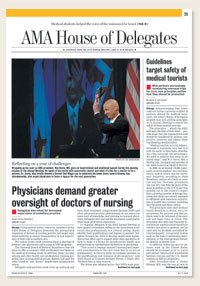AMA House of Delegates
AMA meeting: Resident work hours stir passionate debate
■ Testimony from both sides ends with no changes to work hour limits, but the AMA will support making it easier to report violations.
By Emily Berry — Posted July 7, 2008

- ANNUAL MEETING 2008
- » Our coverage
- » Print special section
- » AMA official proceedings
- » Meeting notes: Medical education
- » Related content
Chicago -- Spontaneous applause from delegates followed testimony both in support of and opposition to further limits on resident work hours. But neither side won the endorsement of the AMAHouse of Delegates.
Instead, the AMA will encourage the Accreditation Council for Graduate Medical Education to continue studying the issue.
Delegates did agree that reporting work hour violations should not pose a threat to doctors' careers or training. The house approved a resolution encouraging the ACGME and American Osteopathic Assn. to "reduce barriers" to reporting violations.
However, some delegates testified before the AMA's Committee on Medical Education that the 80-hour weekly limit is hurting patients and doctors.
"We're very concerned with the culture we're creating," said Don Swikert, MD, a delegate and family physician from Edgewood, Ky.
Krystal Tomei, MD, a neurosurgery resident from Jersey City, N.J., in testimony before the committee and the full house, expressed concern that any further reductions to work hours would leave her and younger students unprepared. "I knew what I was getting into."












